Political Science Revitalized
Political Science Revitalized
Filling the Jigsaw Puzzle with Metatheory
Michael Haas
LEXINGTON BOOKS
Lanham Boulder New York London
Published by Lexington Books
An imprint of The Rowman & Littlefield Publishing Group, Inc.
4501 Forbes Boulevard, Suite 200, Lanham, Maryland 20706
www.rowman.com
Unit A, Whitacre Mews, 26-34 Stannary Street, London SE11 4AB
Copyright 2017 by Lexington Books
All rights reserved . No part of this book may be reproduced in any form or by any electronic or mechanical means, including information storage and retrieval systems, without written permission from the publisher, except by a reviewer who may quote passages in a review.
British Library Cataloguing in Publication Information Available
Library of Congress Cataloging-in-Publication Data Available
Names: Haas, Michael, 1938- author.
Title: Political science revitalized : filling the jigsaw puzzle with metatheory/Michael Haas.
Description: Lanham : Lexington Books, [2017] | Includes bibliographical references and index.
Identifiers: LCCN 2017023772 (print) | LCCN 2017014157 (ebook) | ISBN 9781498556699 (Electronic) | ISBN 9781498556682 (cloth : alk. paper)
Subjects: LCSH: Political sciencePhilosophy. | Political scienceHistory.
Classification: LCC JA71 (print) | LCC JA71 .H224 2017 (ebook) | DDC 320.01dc23
LC record available at https://lccn.loc.gov/2017023772
 The paper used in this publication meets the minimum requirements of American National Standard for Information SciencesPermanence of Paper for Printed Library Materials, ANSI/NISO Z39.48-1992.
The paper used in this publication meets the minimum requirements of American National Standard for Information SciencesPermanence of Paper for Printed Library Materials, ANSI/NISO Z39.48-1992.
Printed in the United States of America
dedicated to David Easton (19172014)
Contents
Tables
Figures
While studying political science at Stanford and Yale in the early 1960s, behavioralism was the rage. As an undergraduate, I was first introduced to knowledge produced by behavioralists in a course taught by John Bunzel. As a graduate student, I was most influenced by behavioralists Robert Dahl, Karl Deutsch, Heinz Eulau, Robert Lane, and Robert North. At the same time, my undergraduate experience with Charles Drekmeier and graduate courses with Fred Watkins caused me to appreciate political theory. I accepted behavioralism with a certain grain of salt, and said so in 1966 as a conference paper, later published, with the title A Neotraditional Plea to Some Political Behavioralists. The thesis was that behavioralists were not really as scientific as they pretended and that traditional research in political science should not be forgotten, including policy-relevant research. I was joined by political scientist Ted Becker in some of the permutations of the essay (Haas 1967; Haas and Becker 1970a,b). When a behavioralist took exception to the critique, I the n wrote Three Types of Science (1969) as a response in a major journal, arguing that every discipline should have room for theory, research, and policy applications.
But political science is now described as a jigsaw puzzle that nobody seems to want to solve (Sigelman 2006b, v). I perhaps should accept blame, because I was the first one to propose Sections while a member of a committee to rewrite the APSA constitution during 1970. Since my retirement from the University of Hawaii after some thirty-five years, I have been pondering how to provoke the profession into such a transformation. Now that is the aim of the present volume.
Behavioralism was opposed for good reasons by postbehavioralists, who stressed policy relevance at the time of the Civil Rights Movement and Vietna m War. But there was a nihilist streak among some postbehavioralists, who later turned to variants of postmodernism, poststructuralism, and const ructivism to deny that any objective science of politics was possible. But more recently, the once-rebellious constructivists have rediscovered the value of some of the concepts of the behavioralists. The concept of security community of Karl Deutsch and associates (1957), for example, has been embraced as a viable concept by constructivists Emanuel Adler and Michael Barnett (1998), and many more examples are found herein.
Consequently, the worm may have turned back to the scientific pretensions of the behavioralists, albeit with much deserved self-conscious skepticism. To provide a guide in that direction, I authored Polity and Society: Metaphilosophical Underpinnings of Social Science Paradigms (1992). I was therefore chagrined when the book made no impact except for congratulations from the field of philosophy. The centrifugal directions of political science in the 1990s meant that a centripetal book was unwelcome.
Today, the situation is different. The American Political Science Association has gone beyond a century of existence. So has the nominally premier journal, the American Political Science Review . Although many political scientists published ecumenical essays in the one hundredth volume of the Review , they did not bring the profession together but instead celebrated diversity and pluralism within the profession. The present volume, therefore, is designed to make such an effortto find a way to integrate the pieces of the jigsaw puzzle into a coherent whole. In doing so, I borrow from a fleeting term in the writing of David Eastonthe term neobehavioralism.
Chapters in the present volume reflect my thinking over the years along the lines of neobehavioralism. What I mean by the term is that political scientists not only can link theory with research with policy but also try to integrate all three elements in any publication. I do not know whether political science can ever be a science, and I accept criticisms in that regard, but I hope to prove that a political scientist can proceed creatively, modestly, and productively to expand horizons of the field while motivated by the fundamental quest to improve humanity and the planet earth. Before political science is or wants to be a science, in my opinion, scholars must first create a symbiotic discipline.
I have cited the jigsaw pieces of some of my own writings as references in the present volume to provide examples of how a neobehavioralist can operate. The first chapter herein harks back to chapters in the book that I edited with Henry Kariel, Approaches to the Study of Political Science (1970). I onc e wrote an article on the need for sections in the profession, but after submitting the essay, I withdrew the item from consideration when sections were approved. Parts of that article now appear in .
Parts II and III consists of chapters on paradigms, which were expanded from my Polity and Society (1992) in my recent International Relations Theory: Competing Empirical Paradigms (2016b). In the latter volume, I stress the rele vance to international studies, but the present volume focuses more on other subfields of political science, though overlap is inevitable.
Using the trichotomy of Auguste Comte (18301842), international relations is mostly at the theological stage, mired in ideological thinking, while the rest of political science is largely at the empirical stage. The third (metatheoretical or paradigmatic) stage is advanced by the present volume.
Political science does indeed have several macrotheories (paradigms) that can form the basis for a truly theoretical sciencetheories, that is, with research and policy implications. To prove that political scientists have been doing research that could be integrated paradigmatically, I decided to cite relevant research from the literature of prominent journals for the years 2000, 2008, and 2016. Except for the Rational Choice paradigm, many authors seem entirely unaware of the larger paradigmatic implications of their recent research. Yet their contributions are far more numerous than those that have sought to prove rationality in political decision-making.
Next page
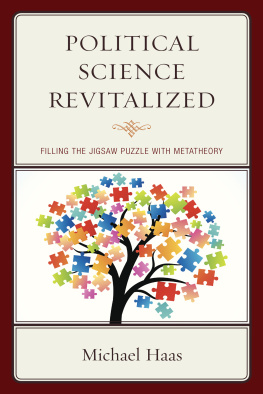



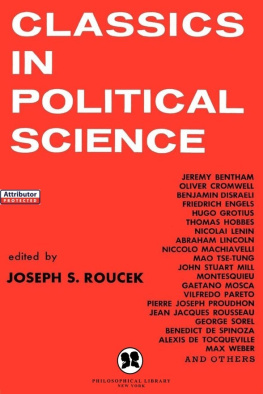
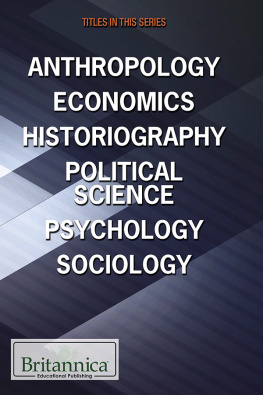
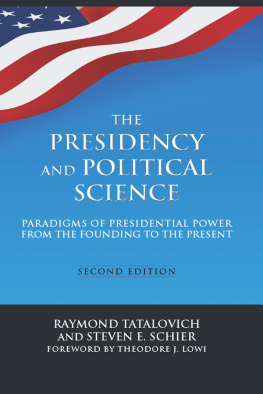
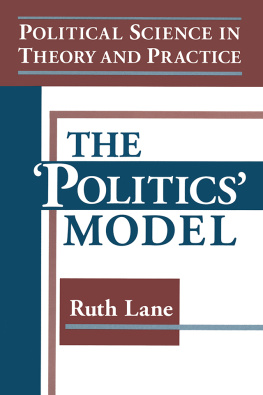
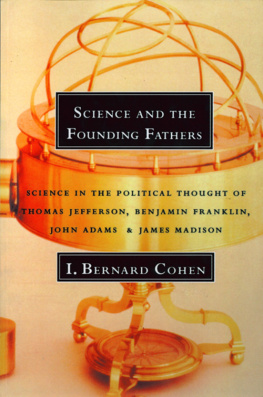
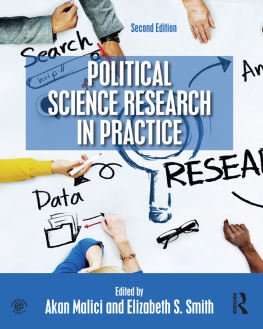

 The paper used in this publication meets the minimum requirements of American National Standard for Information SciencesPermanence of Paper for Printed Library Materials, ANSI/NISO Z39.48-1992.
The paper used in this publication meets the minimum requirements of American National Standard for Information SciencesPermanence of Paper for Printed Library Materials, ANSI/NISO Z39.48-1992.